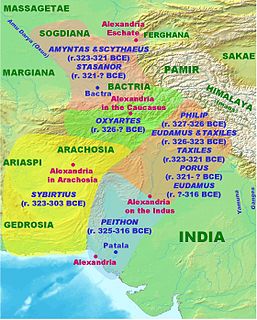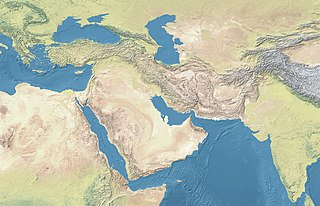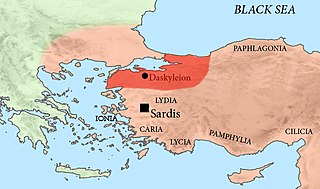This article concerns the period 319 BC – 310 BC.
Year 314 BC was a year of the pre-Julian Roman calendar. At the time, it was known as the Year of the Consulship of Libo and Longus. The denomination 314 BC for this year has been used since the early medieval period, when the Anno Domini calendar era became the prevalent method in Europe for naming years.
Year 311 BC was a year of the pre-Julian Roman calendar. At the time, it was known as the Year of the Consulship of Brutus and Barbula. The denomination 311 BC for this year has been used since the early medieval period, when the Anno Domini calendar era became the prevalent method in Europe for naming years.

Artabazos was a Persian general in the army of Xerxes I, and later satrap of Hellespontine Phrygia under the Achaemenid dynasty, founder of the Pharnacid dynasty of satraps. He was the son of Pharnaces, who was the younger brother of Hystaspes, father of Darius I. Artabazos was therefore a first cousin of the great Achaemenid ruler Darius I.

Eumenes of Cardia was a Greek general and satrap. He participated in the Wars of the Diadochi as a supporter of the Macedonian Argead royal house. He died after the Battle of Gabiene in 316 BC.

Balakros, also Balacrus, the son of Nicanor, one of Alexander the Great's "Somatophylakes" (bodyguards), was appointed satrap of Cilicia after the Battle of Issus, 333 BC. He succeeded to the last Achaemenid satrap of Cilicia, Arsames.

Asander or Asandros was the son of Philotas and brother of Agathon. He was a Macedonian general under Alexander the Great, and satrap of Lydia from 334 BC as well as satrap of Caria after Alexander's death.
Mithrenes was a Persian commander of the force that garrisoned the citadel of Sardis. According to Cyril Toumanoff, he was also a member of the Orontid dynasty, of Iranian origin. Waldemar Heckel, on the other hand, considers Mithrenes to be a Persian noble of unknown family background. After the battle of the Granicus Mithrenes surrendered voluntarily to Alexander the Great, and was treated by him with great distinction. Mithrenes was present in the Macedonian camp after the Battle of Issus, and Alexander ordered him to visit the captured family of Darius III and assure them that Darius was alive, before changing his mind and assigning the duty to Leonnatus instead. He fought for Alexander at Gaugamela, and ironically he was fighting against an army that included his father Orontes II. Afterwards, Alexander appointed him Satrap of Armenia.

Sibyrtius was a Greek officer from Crete in the service of Alexander the Great, who was the satrap of Arachosia and Gedrosia shortly after the death of Alexander until about 303 BC.
Stasanor was a native of Soli in Cyprus who held a distinguished position among the officers of Alexander the Great.
Philip was satrap of Sogdiana. He was first appointed to this position by Alexander the Great in 327 BC. He retained his post, as did most of the satraps of the more remote provinces, in the arrangements which followed the death of the king in 323 BC; but in the subsequent partition at Triparadisus in 321 BC, he was assigned the government of Parthia instead. Here he remained until 318 BC, when Peithon, who was then seeking to establish his power over all the provinces of the East, made himself master of Parthia, and put Philip to death.
For other persons with the same name, see Tlepolemus (disambiguation)

Eudemus was one of Alexander the Great's generals. In 326 BC he was appointed by the king as the commander of Alexander's troops in India. After Alexander's death, Eudemus effectively controlled Alexander's northern Indian territories until he became involved in the Wars of the Diadochi during which he was captured and killed by Antigonus.

The Partition of Babylon was the first of the conferences and ensuing agreements that divided the territories of Alexander the Great. It was held at Babylon in June 323 BC. Alexander’s death at the age of 32 had left an empire that stretched from Greece all the way to India. The issue of succession resulted from the claims of the various supporters of Philip Arrhidaeus, and the as-of-then unborn child of Alexander and Roxana, among others. The settlement saw Arrhidaeus and Alexander’s child designated as joint kings with Perdiccas serving as regent. The territories of the empire became satrapies divided between the senior officers of the Macedonian army and some local governors and rulers. The partition was solidified at the further agreements at Triparadisus and Persepolis over the following years and began the series of conflicts that comprise the Wars of the Diadochi.
Nicanor was a Macedonian officer of distinction who served as satrap of Media under Antigonus.

Arsames was an Achaemenid Persian satrap of Cilicia in 334/3 BC. He succeeded Mazaeus in this position. He took part in the Battle of Granicus where he fought with his cavalry on the left wing, along with Arsites and Memnon of Rhodes. He was able to survive that battle and flee to the capital of Cilicia Tarsus. There he was planning a scorched-earth policy according to that of Memnon which caused the native Cilician soldiers to abandon their posts. He also decided to burn Tarsus to the ground so as not to fall in the hands of Alexander but was prevented from doing so by the speedy arrival of Parmenion with the light armored units who took the city. After that, Arsames fled to Darius who was at this time in Syria. He was slain at the battle of Issus in 333 BC.

Arsites was satrap of Hellespontine Phrygia in the 4th century BC. His satrapy also included the region of Paphlagonia.
Andronicus of Olynthus was a Macedonian nobleman and general in the 4th century BCE.
Atizyes was a Persian satrap of Greater Phrygia under the Achaemenids in 334 BC, when Alexander the Great began his campaign. He is not mentioned in the council of Zelea where the satrap coalition was formed against the invasion, so it is not sure whether he took part in the battle of the Granicus. After the battle, he appears to be in the capital of Greater Phrygia, Celaenae where he had a garrison force of 1,000 Carians and 100 Greek mercenaries. He himself went to Syria to join the army of Darius III and fell in the battle of Issus at 333 BC. After Phrygia fell to Alexander, he appointed his general Antigonus Monophthalmus as its satrap.

Amminapes was a Parthian who was appointed satrap of the Parthians and Hyrcanii by Alexander the Great in 330 BCE.











